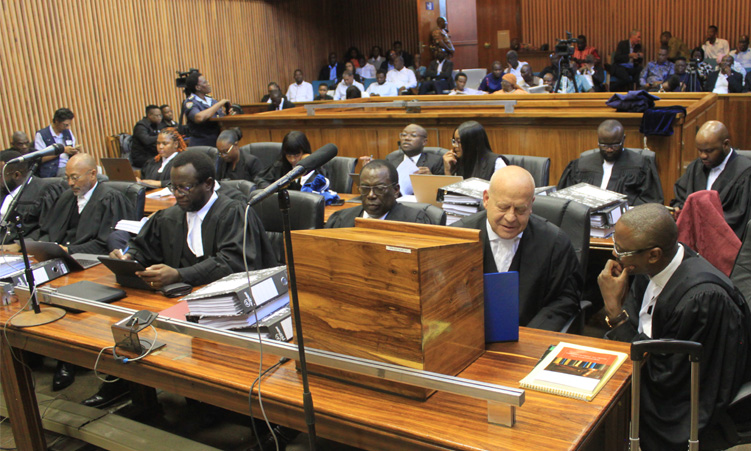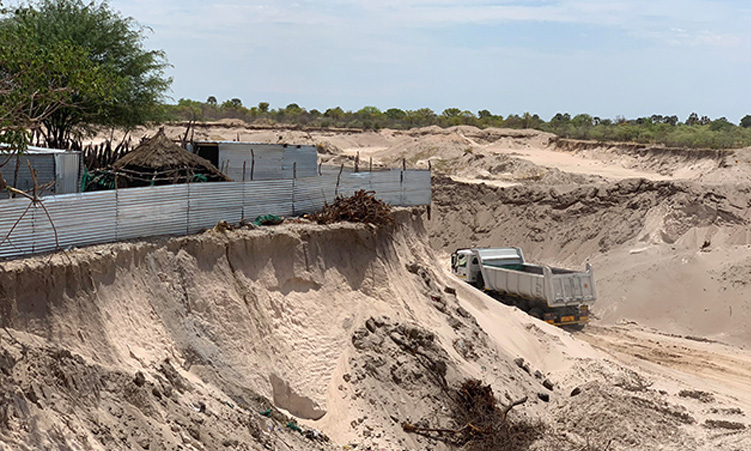ALTHOUGH more than 20 per cent of Government expenditure is devoted to education, infrastructure is lacking and qualified teachers are leaving the profession in search of greener pastures, says Deputy Prime Minister Libertina Amathila.
In a speech delivered on Amathila’s behalf at a recent event at Walvis Bay, the Minister said that 90 per cent of the annual education budget goes towards personnel costs, leaving very little for buildings, materials and equipment. Furthermore, Namibia has a shortage and uneven distribution of qualified teachers – particularly those specialising in English, science and mathematics.Amathila said a recent regional education report concluded that only a third of Namibian sixth-graders have mastered the required competencies in literacy and mathematical skills.The Deputy Prime Minister’s speech was delivered by Denise van Bergen, Chairperson of the Namibian Fishing Associations, at Standard Bank’s handover ceremony of 500 chairs to Immanuel Ruiters Primary School in Walvis Bay.She said the shortage of skilled primary-school teachers, too few classrooms to accommodate the growing number of pupils and the promotion of ill-prepared pupils to higher grades are fundamental shortcomings in the education system.”While Government spends the majority of the education budget on salaries, it must be realised that teachers are not the best-paid people in Namibia and that many teachers have left the profession because of poor pay.That is an area of concern…” according to Amathila.She applauded Standard Bank for making education the top priority of its social investments.Standard Bank’s Managing Director Theo Mberirua announced at the occasion that, from next year, the Standard Bank Foundation will commit 50 per cent of its funding towards educational initiatives.”This might amount to N$900 000 in 2007, although it all depends on the bank’s performance.”Mberirua said the latest Unesco research indicates that 18 million more teachers are required worldwide if every child is to receive a quality education.He quoted Hollywood actress and UN ambassador Angelina Jolie who, during her recent visit to Namibia, joined the global campaign towards quality education for every child: “(A)ccording to studies by the Global Campaign for Education, every extra year of school for children in developing countries increases their wage-earning potential and decreases their likelihood of getting sick.You could teach them young about protecting themselves from AIDS, you could teach them young about how to take care of their kids, you could teach them young about vaccinations.If every kid was in school every year, 700 000 less people would get AIDS,” Jolie said in a recent interview.Mberirua considers education, particularly in developing countries, to be in crisis.”Africa will not achieve universal primary education until at least the year 2150,” he said.”Progress towards this is essential.Forty million African children – almost half of the continent’s primary-level children – are not in school; about two thirds of these children are girls.”Mberirua commended Immanuel Ruiters Primary School’s pro-active efforts to secure funds on its own before asking for support to build its school hall.Furthermore, Namibia has a shortage and uneven distribution of qualified teachers – particularly those specialising in English, science and mathematics.Amathila said a recent regional education report concluded that only a third of Namibian sixth-graders have mastered the required competencies in literacy and mathematical skills.The Deputy Prime Minister’s speech was delivered by Denise van Bergen, Chairperson of the Namibian Fishing Associations, at Standard Bank’s handover ceremony of 500 chairs to Immanuel Ruiters Primary School in Walvis Bay.She said the shortage of skilled primary-school teachers, too few classrooms to accommodate the growing number of pupils and the promotion of ill-prepared pupils to higher grades are fundamental shortcomings in the education system.”While Government spends the majority of the education budget on salaries, it must be realised that teachers are not the best-paid people in Namibia and that many teachers have left the profession because of poor pay.That is an area of concern…” according to Amathila.She applauded Standard Bank for making education the top priority of its social investments.Standard Bank’s Managing Director Theo Mberirua announced at the occasion that, from next year, the Standard Bank Foundation will commit 50 per cent of its funding towards educational initiatives.”This might amount to N$900 000 in 2007, although it all depends on the bank’s performance.”Mberirua said the latest Unesco research indicates that 18 million more teachers are required worldwide if every child is to receive a quality education.He quoted Hollywood actress and UN ambassador Angelina Jolie who, during her recent visit to Namibia, joined the global campaign towards quality education for every child: “(A)ccording to studies by the Global Campaign for Education, every extra year of school for children in developing countries increases their wage-earning potential and decreases their likelihood of getting sick.You could teach them young about protecting themselves from AIDS, you could teach them young about how to take care of their kids, you could teach them young about vaccinations.If every kid was in school every year, 700 000 less people would get AIDS,” Jolie said in a recent interview.Mberirua considers education, particularly in developing countries, to be in crisis.”Africa will not achieve universal primary education until at least the year 2150,” he said.”Progress towards this is essential.Forty million African children – almost half of the continent’s primary-level children – are not in school; about two thirds of these children are girls.”Mberirua commended Immanuel Ruiters Primary School’s pro-active efforts to secure funds on its own before asking for support to build its school hall.
Stay informed with The Namibian – your source for credible journalism. Get in-depth reporting and opinions for
only N$85 a month. Invest in journalism, invest in democracy –
Subscribe Now!









